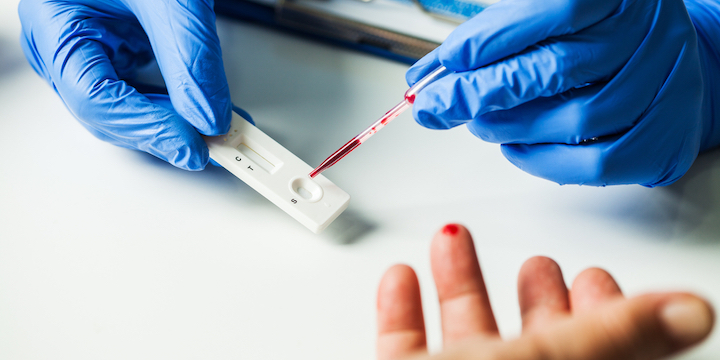A serological test before vaccination. This is the instruction that the High Authority of Health (HAS) could be implemented soon for adults who wish to be vaccinated against covid. This test identifies a past infection by identifying the level of anti-covid antibodies present in the blood.
One dose after infection
Currently, what is the protocol? If you’ve never had covid, you need two doses of the vaccine, six weeks apart for Pfizer and Moderna and 12 weeks apart for AstraZeneca.
On the other hand, if you have already had covid, you only need one dose, at least three to six months after a symptomatic form. If your covid infection is older than the last six months, the instructions are the same: you will be given only one dose.
Why ? Because people who are cured of covid have already made antibodies in response to infection, and these antibodies persist in the body for several months. The infection acts as a sort of first dose and the vaccine dose acts as a booster.
Read also: Infection or vaccination, the same immunity?
A test on the day of the first dose
This is not always the case for asymptomatic people who may not have made enough antibodies for the infection to be immune. And since there is no risk in vaccinating a person who is naturally immune, a serological test, which shows whether the person tested has already had covid, was not required.
But that could change: “we are going to suggest, provided that it does not slow down the vaccination process, that possibly at the time of the first dose, we look to see if you have antibodies which will allow you to make the appointment or not for the second dose “ revealed Professor Dominique Le Guludec, President of HAS, at the microphone of RMC / BFMTV May 31.
Quick results
In practice, these would be rapid serological tests, the TROD tests carried out with a drop of blood. The results can be obtained in 15 to 20 minutes and indicate whether or not the person tested has antibodies.
It should be done on the day of the first dose and not between the two doses because the vaccine causes, like infection, the production of antibodies, which would distort the test.
Release doses
The benefit of performing this test at the time of the first dose would be twofold. It would indeed “to avoid the second dose to many people” but also “have more doses available for a first injection“, said Professor Le Guludec.
Another advantage: avoid vaccinating people infected too recently by the virus, less than three months ago. The vaccine is then useless because the body of the vaccinated person already contains a lot of antibodies.
Do not put too much strain on the immune system
Last scenario: the vaccinated person has covid, with or without symptoms, at the time of vaccination. The risk in this case is to put too much strain on the immune system, which is already busy fighting the virus.
A serological test will not identify this situation, because the production of antibodies is not immediate. Only a PCR test, which detects the presence of the virus at an instant t, will be able to identify this scenario.
This is also why the health authorities ask people in contact to postpone their vaccination and to carry out a PCR test to confirm or not an infection.
 Cherry tomatoes contaminated with salmonella: 92 sick and 1 dead
Cherry tomatoes contaminated with salmonella: 92 sick and 1 dead  A better coaching method can make a person grow
A better coaching method can make a person grow  What is the method to prevent diabetes in children?
What is the method to prevent diabetes in children?  What are the effective factors in causing stomach ulcers?
What are the effective factors in causing stomach ulcers?  Why do embarrassing memories seem to appear at night?
Why do embarrassing memories seem to appear at night?  The amazing link between SARS-CoV-2 infection and newly started diabetes
The amazing link between SARS-CoV-2 infection and newly started diabetes  WHO says monkey pox is not a global emergency right now
WHO says monkey pox is not a global emergency right now  Single cell RNA sequencing uncovers new mechanisms of heart disease
Single cell RNA sequencing uncovers new mechanisms of heart disease  Hepatitis of unknown origin: 3 new deaths and 228 cases worldwide
Hepatitis of unknown origin: 3 new deaths and 228 cases worldwide 